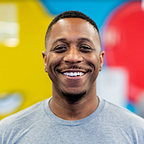The American Choke
The horrific murder of George Floyd last week and the events following ripped open an old, unhealed wound many blacks have silently treated for centuries.
Mr. Floyd, a 46-year old black male, died in the streets on a sunny Minnesota afternoon following the lethal force administered by a white cop doing what he thought his badge and privilege afforded.
This story — his story’s end — is sadly and frustratingly familiar. Mr. Floyd’s life ended like so many others: Eric Garner, Breonna Taylor, Ahmaud Arbery, Sandra Bland, Tamir Rice, Alton Sterling, and Trayvon Martin have been publicly executed for “crimes” the likes of using a fake $20 bill, selling loose cigarettes, taking a morning jog, sitting at home, failing to signal a lane change while driving, playing in a park, and unsurprisingly, simply looking suspicious.
Read these accounts. Let them sit with you. Let your outrage bleed out the emotion we are all feeling.
Unfortunately, Mr. Floyd’s story is made more poignant by the manner in which his life was taken from his family and community. For 8 minutes and 46 seconds, continuously and unwaveringly, a white cop used his body’s weight as force to restrain Mr. Floyd by pinning his knee to Mr. Floyd’s neck. In the streets of Minneapolis, this white cop continued to do so even after Mr. Floyd’s consciousness had expired and paramedics had arrived on scene.
What followed was only a degree less gruesome.
As cars passing by honked and onlookers screamed and cried, the other three cops (2 white & 1 asian) on the scene watched approvingly. And Mr. Floyd, being choked to death, used the last moments of his consciousness to say:
“I can’t breathe”…
“Please, the knee in my neck”…
“My stomach hurts, my neck hurts, everything hurts”…
“Don’t kill me”…
“Mama”…
As Mr. Floyd’s story is objectively recounted by the videos capturing his death, one ineffaceable image has stuck with me and I imagine many others: the powerlessness of not being heard.
Even while Mr. Floyd pleaded for his life; even while onlookers screamed he was dying; and even the sirens signaling an ambulance had arrived to save his life; none was enough. No one could be heard. No sound or scream could stop the choke. No one’s voice could give him sufficient oxygen.
Those of us who have platforms, voices, audiences, and followings have issued or are drafting public statements that all start with a common sentiment: “…it’s hard to find the words”. But, point of fact, it isn’t. It’s very easy to find the words. Here they are for anyone struggling:
The death of Mr. George Floyd is an outrageous example of systemic racism in America.
So, if good people can find the words, what really remains so hard to do? I submit that it’s very difficult for good people, white or black, to find the voice to say them.
Since 1619, when the first human cargo arrived on the shores of Virginia, people of color have been voiceless or unheard. As slaves; as indentured servants; as “boys” who were men in the Jim Crow South; and yes, as professors, and scientists, and entrepreneurs, and politicians in the modern era. Black people have either screamed into a vacuum or been silenced.
This materializes in distinct, but mutually important ways. A couple of hundred years ago, if you were an ‘Uppity’ Negro and spoke your truth, you would be beaten until you were silent; and many times, that would lead to your death. Now — today — if you are the ‘first’ in your family to do something professional — college, graduate school, corporate America, startup — you can be fired, demoted, or not funded if you spoke the truth of which your life experience informs. Look no further than the famous kneel of Colin Kaepernick.
Instead — then and now — brutally powerful white men require us black people to say or express what they approve, not what we choose. And if we don’t, like the white cop’s knee, they strangle the life out of our careers, our platforms, and our futures.
They choke us.
Every black person knows this but is helpless to its participation. In fact, begrudgingly, we silence ourselves when close to improving our personal or professional situation, even if we feel strongly offended by our deteriorating status in America. The linguistic carefulness of Barack Obama and a handful of black Fortune 500 CEOs serve as the best example among the elite and well-regarded.
But this happens every day and in every neighborhood: when a black man is stopped by a white police officer or when a white business leader comments on how articulate a black man is. We have things to say, but we dare not.
Indeed, we choke ourselves.
And this chokehold projects itself into well-meaning friends, colleagues, and supporters of blacks. Like us, our white supporters want to give voice to racial issues they see and hear, but their messages are always curated by Boards, Committees, PR teams, and yes, their own honest and understandable fear of retribution or retaliation.
You see: everyone, in some way, chokes on the right words to say at the right time to actually move our conversation about race in America forward. But only we black people actually die from this lack of oxygen. And only we black people feel even less heard or respected.
In the coming days, black people who have been voiceless and unheard will scream. Their white counterparts and supporters will scream. And some good people will do deeply regrettable things while trying to find their voice.
As a society, as Americans, all searching for the voice to say what we feel, we need to give oxygen to this moment. We shouldn’t attempt to be silent. We shouldn’t attempt to return to normal.
What we all must do is speak.
